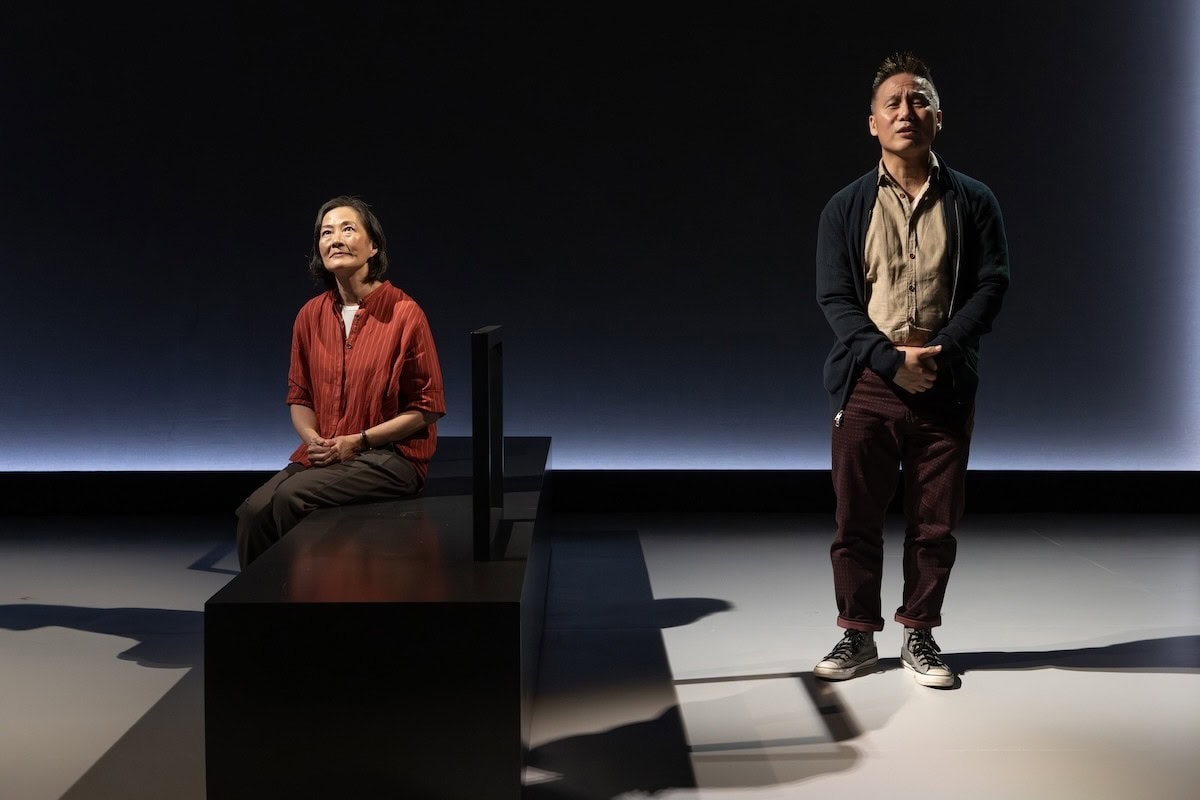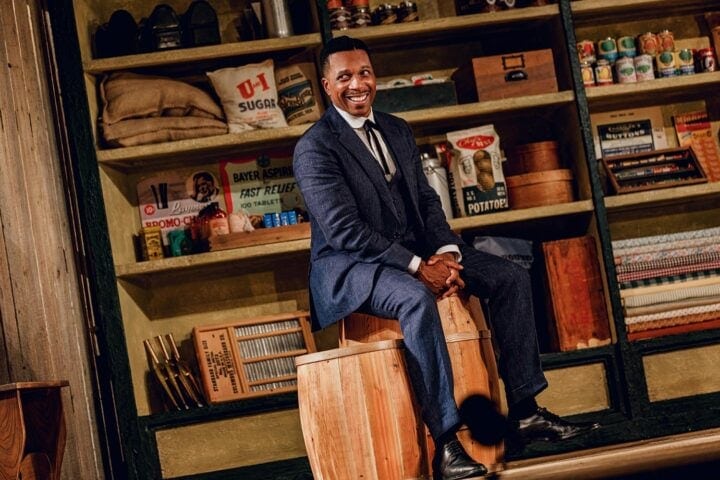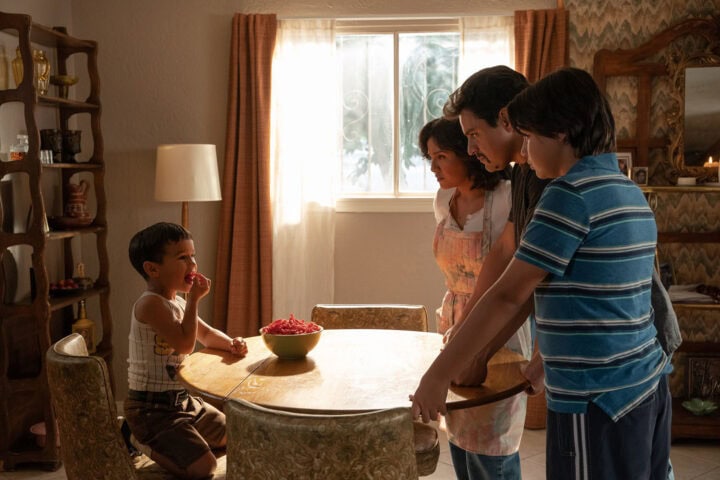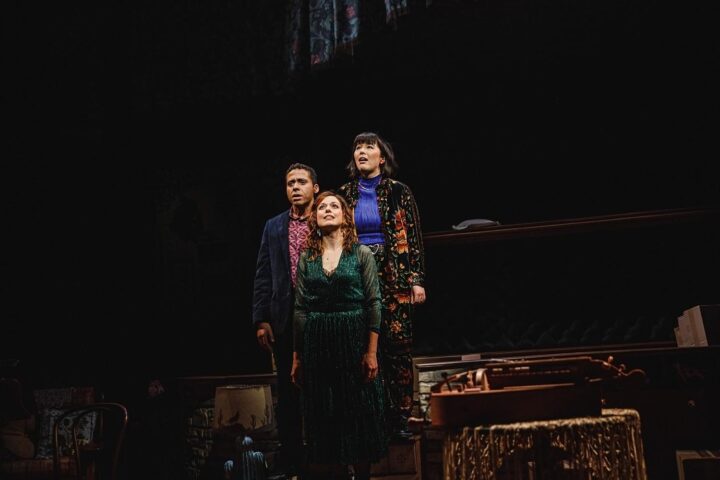If you’re going to share a whole life story, you’d better be a marvelous storyteller. That’s the challenge facing the playwrights—and the actors—in a pair of plays putting down roots this week, a Broadway revival of Samm-Art Williams’s Home and Atlantic Theater Company’s world premiere of Shayan Lotfi’s What Became of Us. Each play takes an interest in poeticizing, through narration, the cradle-to-geriatric journey of so-called ordinary American lives.
In Home, which originated with the Negro Ensemble Company in 1979 before transferring to Broadway (and receiving a 1980 Tony nomination for best play), Cephus Miles (Tory Kittles) doesn’t dream much further than his native land of Cross Roads, North Carolina, “a soil to raise strong children on.” It’s a vision of the future that Cephus’s childhood sweetheart, Pattie Mae (Brittany Inge), swiftly dismisses once she’s been away to college: “I see more in a day than you’ve seen in your whole life,” she tells Cephus, explaining why she’s moving on.
Williams’s play, though, argues that a life lived meaningfully doesn’t have to look like a life lived largely and that America can ravage people like Cephus who just want to settle in place. Cephus goes to jail for resisting the draft, but he’s broken the law because of his plainly put pacifist commitments (“Thou shall not kill,” he keeps insisting) rather than any broader political ideology (“I never even heard of Vietnam,” he explains as he’s sentenced). And when, as an outcast, he flees to the city, it’s an utter disaster. The welcome he receives almost kills him. “Going home from up the road you got to look prosperous. The North is suppose to be good for you,” Cephus winkingly admits upon his return. “I don’t want to damage the myth.”
Assisting Cephus in telling his tale are a pair of narrators (Inge and Stori Ayers) who weave compellingly in and out of an assortment of characterizations. The three players have an easy, melodious rapport as they deliver Williams’s richly musical text; it’s the chugging train of language that propels the work more than the thinly sliced fable itself. And Cephus himself becomes renowned for that kind of ebullient word-weaving, with Kittles seeming to monologue jubilantly at two times the speed whenever Cephus launches into a local legend from his youth. “You’re just going to sit there spinning tales, and acting like an old man, huh?” Ayers’s narrator asks him. Indeed, Cephus is born for an old man’s porch rocking-chair and a captive audience.
And if you’re not held entirely captive from beginning to end—Williams’s yarn has some overly lyrical patches that drift the momentum sideways—the play still offers a sweet, small-scale embrace. Kenny Leon’s staging is also small-scale—probably too small for the Todd Haimes Theatre. Although occasional set pieces roll in and out to suggest the tobacco fields, the prison cell, and the fire escapes of city streets, those are purely decorative gestures. Almost all of the action takes place on a platform center-stage that’s just large enough for the three performers.

But even if Leon hasn’t stretched Home to fill the space, there’s a poignancy to spotlighting this playwright at this moment: Williams passed away on May 13, four days before preview performances began. If this revival doesn’t quite constitute a homecoming parade, it’s a cozy, unflashy tribute, perhaps just the way Cephus Miles would have dreamt it.
Extra-textual circumstances serve as more of a distraction for What Became of Us, narrated by a pair of siblings who grow apart and seek reconnection as they grow older. In a deliberate artistic switcheroo, while the first half of the run features BD Wong and Rosalind Chao, Chinese-American performers, they’ll be replaced, in mid-June, by Tony Shalhoub (who’s of Lebanese descent) and Shohreh Aghdashloo (who’s Iranian). The point is, according to the playwright Shayan Lotfi, that the immigrant family’s story is universal.
But generalization begets generalization, and Lotfi goes out of his way to ensure that the siblings—brother Z and sister Q—speak about their cultural identities with a fuzziness that’s ultimately disengaging. They refer opaquely throughout to “the old country” and Q cites a vague variety of reasons for her parents’ migration, such as “people being punished for things outside their control.” But since the aim of the ambiguity is to support diverse diasporic casting—something most audiences won’t experience unless they see What Became of Us twice—it’s a distancing decision that makes it harder to care about these characters. (Uptown, it’s those needlepoint particulars that create Home’s funniest and most affecting moments.)
Q and Z spend most of the play trading sentences that begin with “you,” as if they’re narrating each other’s stories, though without ever making eye contact. (“You realized that objects still existed even when you left the room,” “You decided to try out cruelty,” and so on.) They switch to “I” sentences after a scathing rift divides them in young adulthood.
Wong and Chao, warm and wry in the scenes that actually place them in dialogue together, don’t have the kind of transportive musicality in their voices that might make the repetitive sections rhythmically animated. But they’re both rather lovely in their cautiously teasing and anxiously tender dynamic when Lotfi fleetingly allows them to live in scenes with each other. If Home’s pleasures lie in the propulsive motors of heightened language, What Became of Us nests most successfully in the play’s quiet corners of real conversation.
Home is now running through July 21 at the Todd Haimes Theatre, and What Became of Us is now running through June 29 at the Atlantic Stage 2.
Since 2001, we've brought you uncompromising, candid takes on the world of film, music, television, video games, theater, and more. Independently owned and operated publications like Slant have been hit hard in recent years, but we’re committed to keeping our content free and accessible—meaning no paywalls or fees.
If you like what we do, please consider subscribing to our Patreon or making a donation.






